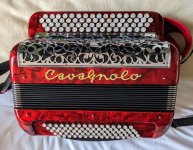Lovely... you'll enjoy I'm sure.
Further to Steve's notes it's probably worth mentioning that to allow the 7th chord to substitute for a diminished it is stacked differently ...it comprises notes 1,5,7....where on the usual stradella notes 1,3,7 outline the chord....
So be careful if you're playing any altered 5th chords...on a plus (and this has just dawned on me while writing this)the 7th stacked this way could be used for either dom7 or min7chords....wonderful...
Further to Steve's notes it's probably worth mentioning that to allow the 7th chord to substitute for a diminished it is stacked differently ...it comprises notes 1,5,7....where on the usual stradella notes 1,3,7 outline the chord....
So be careful if you're playing any altered 5th chords...on a plus (and this has just dawned on me while writing this)the 7th stacked this way could be used for either dom7 or min7chords....wonderful...


